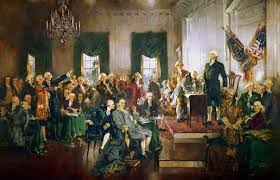
Introduction
Thomas Jefferson to Roger C. Weightman, June 24, 1826
Thomas Jefferson, “Report to The Commissioners of The University of Virginia (The Rockfish Gap Report),” 1818
Jefferson’s letter to Roger Weightman was the last one he wrote, composed eleven days before he died, on the 50th anniversary of the Declaration of Independence, July 4, 1826. The letter was occasioned by an invitation to the anniversary celebration that was to take place in Washington. Jefferson wrote to express his regret that ill-health prevented his attendance. But he also wrote to express his belief that the truths stated in the Declaration would sooner or later become accepted throughout the world. “All eyes are opened, or opening, to the rights of man. The general spread of the light of science has already laid open to every view the palpable truth, that the mass of mankind has not been born with saddles on their backs, nor a favored few booted and spurred, ready to ride them legitimately, by the grace of God.”
Jefferson’s last letter is rightly taken as an expression of the sense of justice and optimism characteristic of the American Founding. The Declaration declared all men equal, and that meant that no man had a right to treat another as every man had a right to treat his horse. Whatever the differences among humans, none amounted to the difference between humans and the animals that they could use as they saw fit. Acknowledging the differences among humans, the Founding put greater emphasis than any previous political order on what humans had in common, what made them equal one to another. As equal to each other in this sense, no one had the right to rule or treat anyone else, as all had the right to rule or treat horses and other animals.
This sense of what justice required rested on the idea that humans formed a distinct kind, different from other animals and all other kinds of things found in the world. The distinctions between kinds were not arbitrary or invented, but natural. Men were created equal. Why had this equality, said by the Declaration to be self-evident, been ignored since the creation? Jefferson’s answer was two-fold. In an older European past this equality had not been unknown but in more recent centuries monkish ignorance and superstition had blinded men to their equality. “The light of science,” Jefferson wrote to Weightman was now allowing all to see “the palpable truth” that they were equal. The light of science had its first practical consequence in the American revolution but—a cause for optimism—it would continue to spread over time, not only around the world, but also within the United States, where slavery remained a vestige of the old world of ignorance and superstition. Inherent in the Founding was the idea of the progressive realization of the justice required by recognizing human equality.
Education, according to Jefferson, was the principal way that the light of science would spread and progress would occur. Jefferson’s last public service was to lead a commission to design the University of Virginia. The commission’s report, which Jefferson wrote, gives a clear sense of the progressivism of the Founding. Scientific understanding, spread through education, would bring about the indefinite increase of knowledge and human well-being. Made available to the talented found in even the meanest circumstances, schools would turn out “natural aristocrats” to guide the republic.[1] Critical to achieving this progressive realization of justice was escaping the bonds of “veneration for the supposed superlative wisdom of [our] fathers,” as the Commissioners’ report puts it.
By the time Jefferson wrote the report on the University of Virginia he had come to accept the view of modern science that nature “produced units only through all her works. Classes, orders, genera, species, are not of her work. Her creation is of individuals.”[2] A species, Jefferson wrote, was simply a more or less arbitrary selection of traits to which humans had attached a common name for the sake of convenience. Species were not natural, only useful. What about the conception of justice derived from recognizing the human species? Was it also in some way only useful? And if some number of the powerful determined that it was no longer? What then?
Jefferson did not raise, let alone answer, these questions. Instead, despite his scientific understanding, in his last letter, Jefferson repeated, as we have seen, through an arresting image, the moral and political understanding of the Declaration, an idea of justice that stressed what humans have in common. Jefferson asserted as a moral and political fact—human equality—what he believed no longer to be a scientific fact—that individual humans were part of a species. The idea of justice embedded in the Declaration remained self-evident to Jefferson; the associated understanding of nature did not.
We should not assume that because science said something different from morality that morality was therefore groundless. Jefferson held throughout his life that humans possessed a moral sense that allowed them to understand what justice required. Bad theories could confuse this moral sense, but it remained a sound guide in moral and political matters. As he once put it, “state a moral case to a ploughman and a professor. The former will decide it as well, & often better than the latter, because he has not been led astray by artificial rules.”[3] Jefferson supported the authority of science because he thought it supported his political and moral principles, but those principles were his first and most important.
The independent status of morality evident to Jefferson and his commitment to modern science highlights the fact that the moral and political foundation of the American political order was from the beginning in conflict with the scientific understanding that was a source of the Founding’s optimism, because it was supposed to be the guarantee of its progress, endurance, and worldwide triumph. The American political order was progressive—optimistic, forward looking, and open to change—from the beginning, but from the beginning scientific knowledge was in conflict with the superlative moral and political wisdom of its founders.
—P.P.
[1] Thomas Jefferson to John Adams, October 28, 1813 Thomas Jefferson: Writings, ed. Merrill D. Peterson (New York: Library of America, 1984), 1304–10.
[2] Thomas Jefferson to Dr. John Manners, February 22, 1814, Thomas Jefferson: Writings, 1329.
[3] Thomas Jefferson to Peter Carr, August 10, 1787, Thomas Jefferson: Writings, 902.
Thomas Jefferson to Roger C. Weightman, June 24, 1826
. . . I should, indeed, with peculiar delight, have met and exchanged there congratulations personally with the small band, the remnant of that host of worthies, who joined with us on that day, in the bold and doubtful election we were to make for our country, between submission or the sword; and to have enjoyed with them the consolatory fact, that our fellow citizens, after half a century of experience and prosperity, continue to approve the choice we made. May it be to the world, what I believe it will be, (to some parts sooner, to others later, but finally to all), the signal of arousing men to burst the chains under which monkish ignorance and superstition had persuaded them to bind themselves, and to assume the blessings and security of self-government. That form which we have substituted, restores the free right to the unbounded exercise of reason and freedom of opinion. All eyes are opened, or opening, to the rights of man. The general spread of the light of science has already laid open to every view the palpable truth, that the mass of mankind has not been born with saddles on their backs, nor a favored few booted and spurred, ready to ride them legitimately, by the grace of God. These are grounds of hope for others. For ourselves, let the annual return of this day forever refresh our recollections of these rights, and an undiminished devotion to them. …
Thomas Jefferson, “Report to The Commissioners of The University of Virginia (The Rockfish Gap Report),” 1818 (emphasis in original)
. . . We should be far, too, from the discouraging persuasion that man is fixed, by the law of his nature, at a given point; that his improvement is a chimera, and the hope delusive of rendering ourselves wiser, happier or better than our forefathers were. As well might it be urged that the wild and uncultivated tree, hitherto yielding sour and bitter fruit only, can never be made to yield better; yet we know that the grafting art implants a new tree on the savage stock, producing what is most estimable both in kind and degree. Education, in like manner, engrafts a new man on the native stock, and improves what in his nature was vicious and perverse into qualities of virtue and social worth. And it cannot be but that each generation succeeding to the knowledge acquired by all those who preceded it, adding to it their own acquisitions and discoveries, and handing the mass down for successive and constant accumulation, must advance the knowledge and well-being of mankind, not infinitely, as some have said, but indefinitely, and to a term which no one can fix and foresee. Indeed, we need look back half a century, to times which many now living remember well, and see the wonderful advances in the sciences and arts which have been made within that period. Some of these have rendered the elements themselves subservient to the purposes of man, have harnessed them to the yoke of his labors, and effected the great blessings of moderating his own, of accomplishing what was beyond his feeble force, and extending the comforts of life to a much enlarged circle, to those who had before known its necessaries only. That these are not the vain dreams of sanguine hope, we have before our eyes real and living examples. What, but education, has advanced us beyond the condition of our indigenous neighbors? And what chains them to their present state of barbarism and wretchedness, but a bigotted veneration for the supposed superlative wisdom of their fathers, and the preposterous idea that they are to look backward for better things, and not forward, longing, as it should seem, to return to the days of eating acorns and roots, rather than indulge in the degeneracies of civilization? And how much more encouraging to the achievements of science and improvement is this, than the desponding view that the condition of man cannot be ameliorated, that what has been must ever be, and that to secure ourselves where we are, we must tread with awful reverence in the footsteps of our fathers. This doctrine is the genuine fruit of the alliance between Church and State; the tenants of which, finding themselves but too well in their present condition, oppose all advances which might unmask their usurpations, and monopolies of honors, wealth, and power, and fear every change, as endangering the comforts they now hold. . .




